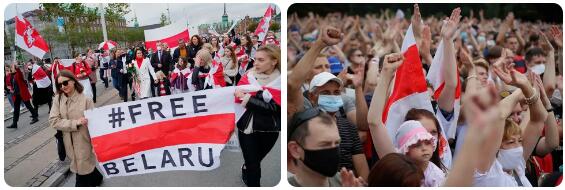Belarus: Political System
According to COMPUTERMINUS.COM, Belarus is a presidential republic. The head of state is the President, who has great powers. The bicameral parliament consists of the House of Representatives with 110 members and the Republic Council, which consists of 64 representatives from the regions and 8 members appointed by the head of state. Parliamentary elections take place every four years. The head of state is directly elected every 7 years; re-election is possible once. See AbbreviationFinder for more information about Belarus politics, and acronyms as well.
The official name of the country is:
| Republic of Belarus Respublika Belarus |
National anthem
The national anthem of a country is a piece of music that is usually underlaid with a text and is intended to express the state, lifestyle and national feeling of a country. It is played on special festive occasions, e.g. on state visits, on special holidays or to honor politicians, business leaders, etc. The national anthem of the respective winning country is also performed at the award ceremony on the occasion of international sporting events such as the Olympic Games, the Tour de France or World and European Championships. In most European countries, the national anthems and flags were introduced at the end of the 18th and beginning of the 19th centuries after they had achieved their independence.
Based on flag descriptions by Countryaah.com, My Belarusy (We, the Belarusians) is the national anthem of Belarus. The music was taken from the anthem of the Belarusian SSR, the composer of which was Nester Sakalouski. The new text used since 2002 comes from Mikhas Klimkowitsch and Uladimir Karysna.
- Check top-mba-universities for public holidays, sports events, UNESCO world heritage sites and major places to visit in Belarus.
In the English translation
We, the Belarusians, are a peaceful people,
with our hearts loyal to our fatherland,
we are good friends and we strengthen ourselves
in an efficient and free family.
Refrain:
Long live the name of our country,
Long live the fraternal union of peoples!
Our dear mother home,
Long live and prosper Belarus!
Together with our brothers for centuries
we defended our home,
In battles for freedom, in battles for life
we won the flag of our victory!
refrain
Friendship between peoples is the power of peoples
And this is our holy sunny path.
Up, go to the clear sky,
O flag of victory, O flag of joy!
refrain
Belarus: personalities
Visual artists, writers
Marc Chagall (Moishe Zakharovich Shagalov) (1887 to 1985)
Painter. The Jewish artist, born in Liosna near Vitebsk in what was then the Russian Empire, created not only his famous paintings and stained glass windows, but also mosaics and theater sets and is considered one of the most important painters of the 20th century. He lived mostly in Paris. He died in March 1985 in Saint-Paul-de-Vence in the French region of Provence-Alpes-Côte d’Azur.
Svetlana Alexievich (born 1948)
2015 Nobel Prize for Literature. Svetlana Alexandrovna Alexievich was born on May 31, 1948 in Stanislav in the Ukrainian Soviet Socialist Republic – today’s Ivano-Frankivsk in western Ukraine. After her father left the Belarusian army, he returned to Belarus with his Ukrainian wife and children. Both parents worked as teachers in a local village and therefore Svetlana Alexievich spent her childhood here. After finishing school she studied journalism at the Belarusian State University in Minsk until 1972. After completing her studies, she worked for a local newspaper and as a teacher in Belarus. In 1976 she went to the literary magazine Neman as a correspondent. In her book “The War Has No Female Face”, completed in 1983, she portrayed the fate of Soviet women soldiers in World War II. As a result, the Soviet censorship authorities accused her of defiling the “honor of the Great Patriotic War”. Because of her “anti-communist attitude” she then lost her position. In her books she addresses, among other things, the Stalin era and the Chernobyl reactor accident. Despite her critical stance towards President Aljaksandr Lukashenka in Belarus, she returned to Minsk in 2011 after spending time in Paris, Stockholm and Berlin. On October 13, 2013 she received the Paulskirche in Frankfurt the Peace Prize of the German Book Trade.
She received the 2015 Nobel Prize for Literature for her polyphonic work, which is a monument to the suffering and courage of our time.
Politicians and rulers
Salman Shazar (1889 to 1874), third President of Israel
The Belarusian Jew and Zionist emigrated to what would later become Israel in 1924, became a member of the first Knesset in 1949 and served as President of the country from 1963 to 1973.
Marek Edelman (born 1922), one of the 5 leaders of the Warsaw Ghetto uprising, the
last surviving commander of the Warsaw Ghetto uprising, wrote several publications about this period. After the war he studied medicine in Poland and worked as a cardiac surgeon. Since the beginning of the 80s, Dr. Edelman in the Solidarność union.
Alexander Lukashenko (1954)
Lukashenko was born on August 30, 1954 in Kopys, Belarus. He has been President of Belarus since 1994. He rules almost unlimited power and allows the opposition to be strictly persecuted.
Theologians and philosophers
Euphrosyne of Polotsk (Efrasinia Polotskaya, around 1110 to 1173), patron saint of the Belarusians.
The princess voluntarily led a life as a nun and died on a pilgrimage in Jerusalem.
Kyrill von Turaw (around 1130 to 1182) Orthodox theologian and bishop
The Christian scholar was also the most important writer of early Belarusian history.
